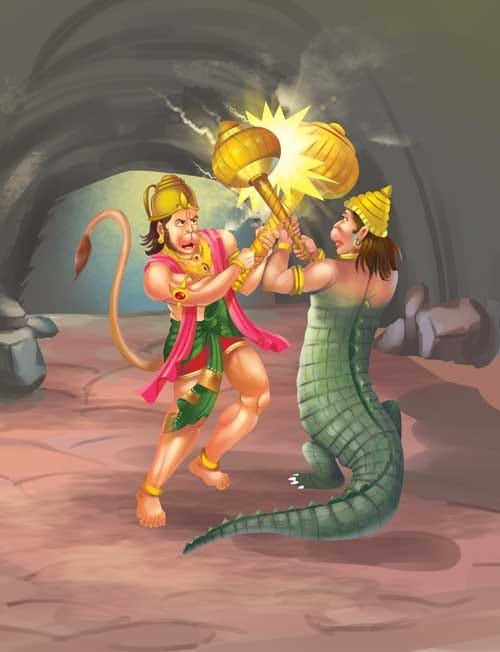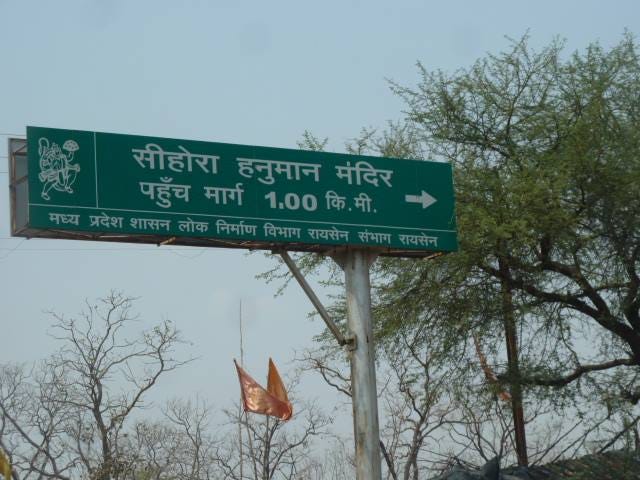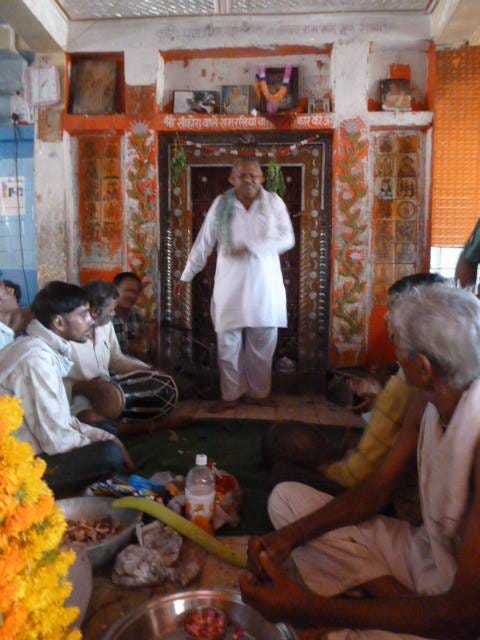Hanuman Jayanti Reflections: The Divine Mystery of his Son, Makardhwaja
Hanuman is also said to have a son—Makardhwaja—a little-known tale that invites us to reflect on the enigmatic ways of divine will and cosmic design.
Lord Rama’s Devout Celibate: Hanuman, the Eternal Servant
On the auspicious occasion of Hanuman Jayanti, observed today, April 12, 2025, we bow in reverence to Hanuman—the beloved monkey god of Hindu tradition—whose life is a shining embodiment of unshakable devotion, boundless strength, and tireless service. A central figure in the Ramayana, Hanuman is celebrated not only for his awe-inspiring feats and steadfast loyalty to Lord Rama, but also for being a Chiranjeevi—one of the immortals, destined to walk the earth through the ages in eternal service of dharma. His vow of Brahmacharya (celibacy) is a cornerstone of his spiritual might, fueling his clarity, focus, and divine energy. Yet, in a mysterious turn of fate, Hanuman is also said to have a son—Makardhwaja—a little-known tale that invites us to reflect on the enigmatic ways of divine will and cosmic design. On this sacred day, it is only fitting to revisit this fascinating and lesser-known chapter from Hanuman’s immortal legacy.
How Hanuman's Son Came to Be
The tale of Makardhwaja's birth is unique and intriguing. It begins with Hanuman's daring mission to Ravana's kingdom of Lanka, where he sets the city ablaze with his flaming tail as a prelude to Lord Rama's attack. After his successful mission, Hanuman dives into the ocean to extinguish the flames. Unbeknownst to him, a drop of his sweat falls into the mouth of a "Makara," a mythical sea creature with characteristics of a crocodile (magarmachh). This accidental encounter leads to the birth of Makardhwaja, who emerges as a hybrid of monkey and fish.
Makardhwaja is found by the people of Ahiravan, the demon king of the underworld (Patala), who raises him to be a fierce warrior and the gatekeeper of his realm. This peculiar turn of events establishes Makardhwaja's place in the epic narrative, though he remains largely unknown in mainstream tellings of the Ramayana.
The Meeting of Hanuman and Makardhwaja
The paths of father and son cross during a crucial moment in the Ramayana. After Ahiravan captures Rama and Lakshmana, Hanuman embarks on a journey to rescue them from the depths of Patala. Upon reaching the gate of the underworld, Hanuman encounters Makardhwaja, the formidable gatekeeper. Despite their familial bond, Makardhwaja is duty-bound to protect his kingdom, leading to a fierce battle between father and son.
In the heat of combat, Makardhwaja reveals his lineage to Hanuman, explaining how he came to be. Hanuman, initially surprised, realises that his son has the same strength and loyalty that define his own character. Hanuman defeats Makardhwaja but acknowledges his bravery and appoints him as the new ruler of Patala, recognizing his integrity and sense of duty.
My Serendipitous Visit to Sihora Hanuman Mandir, Madhya Pradesh
On Hanuman Jayanti, on 15th April 2014, while discharging my Lok Sabha Election Observer duty in the Vidisha constituency in Madhya Pradesh, I happened to pass by one of the region's most revered Hanuman temples—the Sihora Hanuman Mandir in the Begumganj sub-division of Raisen district. Despite the pressures of the electoral task at hand, the sudden opportunity to visit this sacred site felt more than coincidental; it was as if destiny had woven this into my journey.
As I entered the temple grounds, the air was thick with devotion, resonating with the rhythmic chants of Hanuman's name. Devotees of all ages filled the mandir, their prayers and offerings reflecting the deep-rooted faith that has sustained this temple for generations. The atmosphere was vibrant yet serene, a harmonious blend of spiritual energy and devotional reverence. This unplanned visit became a moment of reflection, a pause in the midst of duty, reinforcing the idea that even in our busiest times, there are unexpected blessings that remind us of the deeper currents of faith and spirituality.
God's Plans and Destiny's Surprises
The tale of Hanuman and Makardhwaja stands as a powerful testament to the mysterious and infinite ways in which the Divine operates. Hanuman, the steadfast Brahmachari, known for his singular devotion to Lord Rama, is the very symbol of disciplined celibacy and selfless service. And yet, in an astonishing twist that defies logical expectation, a son—Makardhwaja—emerges from his life story. This paradox is not a contradiction, but rather a revelation of how the cosmic play of destiny often transcends human understanding.
In the grand scheme of divine design, what appears as unexpected or even impossible is often a thread in a larger tapestry woven by God’s will—subtle, deliberate, and beyond the grasp of our limited perspective. Hanuman’s unintended fatherhood does not undermine his purity; instead, it magnifies the mystical nature of divine intent, where even the most disciplined soul may be chosen as a vessel for a larger purpose.
With the Ram Mandir at Ayodhya now consecrated—a sacred milestone achieved just last year—this story echoes even more deeply. It reminds us that life’s most unanticipated turns may carry profound meaning. The paths we walk, often uncertain and bewildering, are not without direction; they are guided by a force far greater than our own will. In that divine scheme, every detour is a direction, and every surprise, a signpost on the journey toward truth and purpose.








